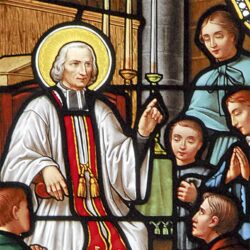A poor and simple man, St. John Mary Vianney became an example of Divine Omnipotence by the holiness of his life and the effectiveness of his actions.
Newsdesk (05/08/2022 8:30 PM, Gaudium Press) The life of St. John Mary Vianney, one of the greatest saints of the nineteenth century, presents many aspects worthy of comment.
He was, in the first decades of the 19th century, a very poor seminarian and, moreover, of remarkably low intelligence. He had to do his seminary studies with extraordinary effort, and for some time his priestly vocation was even doubted because of this insufficiency of intelligence.
He graduated with great difficulty – it could be said that he obtained his seminary diploma only at the limits of his sufficiency – and, because he was such a simple man of so few natural qualities, he was sent by his bishop to a tiny village in the south of France: the hamlet of Ars. There he began his priestly ministry, which filled the whole of Europe with light and then spread to the new world; he was later proclaimed model and patron of the clergy.
Model of the priest
What was it that distinguished this saint? Although he had none of the natural qualities to exercise an extraordinary priesthood, he was nevertheless a magnificent priest, a stupendous apostle, a confessor endowed with rare insight, a preacher who exerted a profound influence on souls and, above all, with a title that is the foundation of all the rest: he was the model priest himself.
What was the reason for the effectiveness of his apostolate?
As Saint Thérèse of the Child Jesus well said, for love, nothing is impossible, and he who truly loves God our Lord and our Lady obtains the means to do what Divine Providence calls him to.
A Teaching Endowed with Power
He was an extraordinary preacher. He studied his sermons, tried to prepare them with care. He did not ascend to the high regions of theology, but his homilies took care of the ordinary catechetical notions with which a priest instructs the people.
Nevertheless, the holy Curé of Ars taught with such unction, compassion, faith and love that everything he said became attractive. And often, since his voice was weak – at that time there were no microphones – he could not make himself heard by the crowds that gathered at the door of the temple and even outside. But just by seeing him and hearing one or another phrase that he uttered, people were converted.
True Martyr of the Confessional
He was also a true martyr of the confessional, where he spent hours hearing confessions. We can imagine what it means for a priest to sit in a real little booth of darkness, listening to people’s sins and giving them advice, for hours and hours. What a tremendous penance this represents!
St. John Mary Vianney was a priest who followed the advice given by St. Alphonsus de Liguori: he listened to each confession without haste, as if he had only that one person to attend to, and he wrestled one on one with the sins of that individual.
He would counsel, he would insist; and when the person did not have the serious and true intention of making amends for his sins, he would deny absolution. This went so far that some parishioners went to other parishes for absolution. He would say, “If other priests want to send you to hell … I am your parish priest, and I will not give you absolution.”
God in a Man
Dom Chautard, in “Soul of the Apostolate,” relates this characteristic fact: Curious about the fame of St. John Mary Vianney, a lawyer from Paris went on a visit to the little town of Ars to meet him. When the lawyer returned to Paris, he was asked:
– What did you see there in Ars?
He gave this answer, which is the greatest glory that a man can have:
– I saw God in a man.
That is, you could see that God was in him. As soon as he began to speak, souls were moved and changed; the conversions he made were astonishing and very numerous.
Dom Chautard asks: Why was the Curé of Ars able to convert, being not very intellectually gifted, while other priests so intelligent often do not convert anyone?
And he answers: He had a great life of thought, of meditation, an intense interior life. And because he had this interior life, he was imbued with and committed to the doctrines that he taught.
And when he spoke, people had the feeling of having a living contact with the truths of which he was the herald. He possessed the anointing, the charism of preaching, and Ars became a centre of pilgrimage: like the lawyer just mentioned, people from all over France, and also from other regions of Europe, came to Ars to see and hear this priest.
After a Whole Day in Church, the Nightly Battle with the Devil Began
This extraordinary priest spent the whole day in church: in the pulpit, in the confessional, at the altar. One might think that when he went home at night, he would enjoy a good rest.
However, there began one of the strangest facets of his life: it was the nightly battle with the devil.
The biographers of Saint John Baptist Vianney tell that he once had a dream in which he saw himself judged by God, and the devil saying against him:
“It is necessary to punish him, because on such an occasion he was very tired and, passing near a fence, he ate two bunches of grapes.”
In fact, he was fleeing from military service, because Napoleon was forcing seminarians to serve in the war. And the devil added:
“Thief! He ate two bunches of grapes, he must be punished!”
And St. John Mary Vianney replied: “You lie, I am not a thief, because I left in such a place the money corresponding to the price of the bunches of grapes, so that the owner, when he passed by, might take it.”
And when a soul particularly dominated by the devil came to confession, the devil began to torment St. John Mary Vianney the night before. On one occasion, he set fire to his bed, and part of the mattress was smeared with flames. Fortunately, he was not injured.
The devil hated him because he felt that one of his victims would be torn from him by the saint. The holy Curé of Ars did penance, scourged himself and prayed for those souls, so that his words would then be the bearer of the graces necessary to bring about their conversions.
He also led a life of intense fasting and made his confessional a long martyrdom of his existence.
He Attributed his Miracles to St. Philomena
To further accentuate his apostolate, Providence gave him the gift of miracles. In his church there was an outstanding relic of Saint Philomena, a martyr. And before performing any miracle, he would say, “Let us pray to St. Philomena!”
And when the miracle was performed, he would claim that it was St. Philomena who had done it, lest the grace and glory of having worked the miracle should touch him.
Revealing the Past in a Miraculous Way
I will close by recalling an extraordinary fact, told by one of his penitents. A young girl went to confession and St. John Mary Vianney said to her:
– My daughter, do you remember that you were on such an occasion at a ball?
We can imagine her feeling. And he continued:
– Do you remember that at a certain moment a very handsome, elegant, correct young man entered the ballroom and danced with several young ladies?
– Yes, I remember.
– Do you remember that you were very eager for him to dance with you?
– Yes, I remember.
– Do you remember that the boy did not, and so you looked at him with a kind of sadness? And when it was time for him to leave the room, incidentally staring at his feet, you noticed a blue light coming from his feet?
– I remember.
– That man was the devil, who took human form and danced at this ball with several girls. He did not ask you to dance because you are a Daughter of Mary and you had the Miraculous Medal on your chest.
He was revealing a past that he could not know; therefore, this could not be anything other than true. It was an amazing revelation. One can imagine the atmosphere created in the little church of Ars as the pilgrims came out, some converted, others with their past unveiled, all regenerated and singing the praises of St. John Mary Vianney.
Plinio Corrêa de Oliveira
Extracted from conferences on 10/7/1968, 22/5/1976, 6/10/1990
Compiled by Roberta MacEwan

































